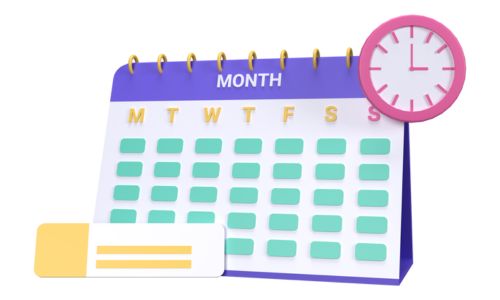A Pediatric Board Study Schedule with Step-By-Step Instructions
Why You DO Need A Study Schedule for the Pediatric Boards

Developing an effective Pediatric Board Study Schedule is crucial for success in the pediatric boards. In this article, we'll outline a comprehensive strategy tailored to your needs, whether you're juggling a busy practice or an unpredictable fellowship schedule.
I often get asked questions along the lines of…
“Can you give me a general pediatric board study schedule?”
“I'm in practice and very busy. Can you provide me with a pediatric board study plan that's going to work for me?”
“Can you provide a pediatric board study schedule for those of us with an erratic schedule because we're in fellowship?”
The answer to all of these questions is “yes.” But, when you’re preparing for your pediatric board exam, the most essential first step is to map out a dedicated amount of time for your studying based on your personal availability and the recommendations in this article. If you are a first-time test taker, and you:
- Graduated from a US medical school
- Have done well on prior board exams
- Scored above 222 on the USMLE Step 1
- Come from a residency program with a high passing rate, and
- Have done well on your most recent In-Training Exam
Then you are likely at low risk for failing the pediatric boards, and this is the study plan for you! For low-risk test-takers, I recommend finding a MINIMUM of 300 hours to block out in your schedule, with plans to go through your Pediatrics Board Review material at least THREE times.
Click Here Now & Go Through the Full PBR Risk Calculator
Pediatric Board Personalized Study Schedule
Please remember, though, that a schedule is only as valuable as your DETERMINATION to follow it. In this article, I break down those 300 hours into a manageable, concrete schedule that you can use to guide your studies and .

Since it’s impossible for me to know exactly what your commitments are, what I’ve tried to do below is map out 14 weeks of study time based on the goal of studying approximately 300 hours.
Even if you do not agree with everything I recommend, keep reading to get some ideas that you can incorporate into your own board preparation plan. At the end of this article, I also share some pearls of wisdom to help you manage all of the study time that will be needed to pass your boards!
What If I'm at “Moderate to High Risk” of Failing the Pediatric Boards?
If the risk calculator helped you realize that you are at moderate or high risk for failing the boards, don’t worry! I've created a 16-week study schedule to help you succeed on the boards! The recommendations in the other article are tailored towards graduates who were told that they were “at risk” of failing the boards based on their in-training exam scores, and those who have already failed the boards at least once.
What Should I Review to Pass the Pediatric Boards?
In this article, we will reference PBR’s core content for the studying resources, which refers to the PBR’s Course Study Guide and PBR’s Q&A book. We strongly recommend that you review your board materials using a multimodal approach. Doing so has proven to increase learning retention. The different modalities should be congruent; they should all work well with each other to reinforce your knowledge base. This strategy has helped thousands of pediatricians pass the boards – from first-time test takers to those who have failed up to 7 times.
While these two books are what we use in this study schedule, the most common bundles that our members use are the All Access Pass and the No Brainer. The All Access Pass includes:
- PBR’s Core Study Guide (Hardcopy and Online Editions)
- PBR’s Question & Answer Book (Hardcopy and Online Editions)
- Virtual Atlas of Pediatric Picture (Online and PDF Editions)
- Audio Course (Streaming and Downloadable Editions)
- Online Video Course
- Live Summertime Q&A Webinars
- And more…
The No Brainer includes everything in the All Access Pass, but it also includes:
- PBR's Full Online Test-Taking Strategies Course
- Personalized Study Schedule creation services by Team PBR (up to 3 schedules)
Click here to get the full pediatric Dermatology and pediatric Gastroenterology Chapters From THIS YEAR's Edition of the PBR. “Try Before You Buy!”

A Pediatric Board Study Schedule For First-Time Test Takers

This comprehensive pediatric board exam study plan is based on committing to an average of 23 hours of studying per week. If you follow the schedule below, you will go through the PBR materials three times, and answer over 500 practice questions. If you stick to the plan, you’ll be done in 14 weeks or LESS (based on your personal life commitments).
A successful study schedule is comprised of both learning and application. Which is why this article will focus on helping you go through the PBR materials and practice questions. I usually recommend AAP PREP ® questions. Below you’ll find a guide that breaks down how you should consider spending your time.
When you go through AAP PREP ® questions (I recommend going through about 3 years of questions), you should NEVER get bogged down with any individual question. Those questions should only be used for practice as I’ve mentioned in the article titled “How Many AAP PREP Questions Should I Do?”
Spend a maximum of 5 minutes on each question. That's 75 seconds to answer each question, and then no more than 3.5 minutes to review each answer. That comes out to about 40 hours of practicing questions. Approximately 240 hours will be spent going through PBR's “core content,” with 20 hours of buffer time to account for additional content review, additional questions, and even mock exams.
What If My Board Exam Is Less Than 8 Weeks Away?
If you have less than 8 weeks, it is still possible to use this schedule. Think of the study schedule as a guide. This outline was created based on the assumption that most people would begin studying at least 14 weeks prior to test day.
If your exam is less than 8 weeks away and you have just started your board preparation, then you will need to study approximately 37 hours per week in order to reach the 300 hours mentioned. We've helped pediatricians pass their board exams even when they waited until the last 4-6 weeks to study! But you must be committed to adjusting your personal and professional obligations in order to put the time in.
And if you need some additional help to stay on track, visit the Discord Channel and find an accountability partner! Or, reach out to Team PBR to see if we are currently offering our Personalized Study Schedule creation service.
Highlighter Study Tip for Passing the Boards
One final tip before you dig into the schedule! This is a great highlighter trick that I teach my PBR members as a focus tool. If you can master this, you will have a more efficient board preparation experience.
For each round of the material, you highlight (or underline) only the areas you are interested in reviewing again. If it feels like you know a topic well enough to recall it on the day of the exam, don’t highlight it.
First, start with your lightest color. Then, with each read through thereafter, use a slightly darker color to highlight sections that you want to review again.
Here are my suggested colors to highlight with each read:1st Round: Pale Yellow2nd Round: Pale Pink3rd Round: Pale Orange
For your first pass, you may end up highlighting 80% or more of the book in yellow. By the time you start your 3rd pass, you should only have to read the areas you highlighted in pink, which could be as little as 30% of the books. In your final weeks, you can focus on just the areas that you highlighted in orange and go through that material again and again.
This will allow you to curate your studying to focus only on items you DON’T understand, as opposed to continually spending time on topics you understand well.
Now let's get started with more details on each week of this 14-week study schedule!
PEDIARTRIC BOARD STUDY SCHEDULE: WEEK #1 – WEEK #6
These first six weeks are all about getting a deep understanding of the materials. Go through PBR’s core content (the Core Study Guide and the PBR Q&A book) at a pace of 18 minutes per page. Take 6 weeks to do so and allot 120 hours in your study schedule for this (20 hours each week).
Cross-check facts, create mnemonics, and make notes in the margins so that you never have to go outside of PBR for additional knowledge or clarifications, and pay close attention to challenging areas. Aim for an average of 18 minutes per page within the two PBR books.
Break up your studying with an average of 5 AAP PREP ® questions per day as directed by PBR. Aim for 5 min per question (including the review of the answer). Over these six weeks, you should complete 210 questions. Questions will take about 3 hours of your time each week.
Listen to your audio board review course EVERYWHERE. Listen during your commutes, listen at the gym, and even listen in the shower. Save the video course for later.
PEDIATRIC BOARD STUDY SCHEDULE: WEEK #7 – WEEK #10
Since you have gone through the material in painstaking detail once, this round will be much faster! At most, you will need about 80 hours over the course of these next four weeks to go through your core content. Aim for an average of 12 minutes per page as you go through the PBR core content and try to only highlight/underline areas that you think will need more review and repetition.
Break up your studying with an average of 5 AAP PREP ® questions per day as directed by PBR. Aim for a maximum of 5 min per question, including the review of the answer. By the end of week 10, you will have completed a total of 350 questions in 12 hours (3 hours per week).
Since you will need 80 hours to review the core content and 12 hours spent practicing questions, you will again need to block off 23 hours per week (92 hours divided by 4 weeks is 23 hours/week). Again, listen to your audio board review course EVERYWHERE. You can choose to build in the Online Video Course during this round, or the next (it follows our core content almost EXACTLY).
PEDIATRIC BOARD STUDY SCHEDULE: WEEK #11 – WEEK #14
The Final Round of Core Content Review
Stick to the schedule and stay disciplined! You should now have a strong foundation of pediatric knowledge and your goal for these four weeks should be to complete your last round of PBR's core content. This final round of review should focus on helping you refresh your memory of familiar topics, and finally cement your knowledge of the difficult ones. For this reason, I recommend that you rely on the Online Video Course heavily during this time.
The Online Video Course is approximately 26 hours long and it covers the core content at a pace of approximately 4 minutes per page. This schedule has budgeted an additional 6 minutes per page for this final round so that you can use the Online Video Course with your Core Study Guide. So pause where needed, and take your time.
To be clear, you must read along in your hardcopy books as you watch the videos in order to count this as one of your 3 rounds of review. This multimodal way of preparing will ensure that you:
- See the highlighted content that you struggle with most
- See the slides in the videos
- Hear a board-certified pediatrician teach you the material that you've been reviewing for 10 weeks, but in a slightly different way
- Force you to review 100% of the content, including anything that you think you know very well and might have otherwise skipped during this crucial time leading up to the boards. And, this system will ensure that you…
- Pass.
Maximizing Final Study Days
Continue to actively read through the core content (take notes, make mnemonics, and continue to highlight using the above strategy). It's quite possible that you will have additional time to study in the final few days before the exam. If so, the content that you highlight during this round (in orange) will be the sole focus of your attention in those final days, and that content will be extremely beneficial for you. It's likely the material that you would otherwise struggle with on the exam.
Make SURE you know the PBR Core Study Guide and the PBR Q&A book inside and out. I simply can't stress this enough because this will be the key to your success! And if you are still uncomfortable with your knowledge base, then it's time to focus on “core pediatrics” that has not changed in the past 10 years.
Practicing Questions In the Final Weeks
The amount of time that you spend on questions during your 14-weeks of preparation can vary quite a bit. Understanding how to fully process a board-style question is a skill. Once you have mastered your test-taking technique, you only need to maintain that skill.
So if you feel like you're now an excellent test-taker, then you may only need to do a handful of questions per week in order to maintain your skill. But if you are still working on improving your test-taking strategy, you'll need to continue practicing questions daily.
When practicing questions, aim for a maximum of 5 minutes per question including the review of the answer. At this point, consider batching questions and doing at least 40 questions in a single sitting per week. Keep in mind that each block in the ABP Initial Certification exam contains over 80 questions, and that you should pace yourself at a pace of 75 seconds per question when answering the question. The remaining time of approximately 3 minutes and 45 seconds per question should be used to review the answers.
Where Do I Go If I Need Help?
The PBR system is designed to ensure that you do not have to do this alone. During this entire experience, you will have multiple ways of getting help.
- Reach out to fellow members of the PBR community in our private Discord channel with any questions or trouble spots. It's an extremely supportive area, and it's for members only.
- Reach out to our content experts using our ASK THE EXPERT! buttons within the Online Video Course and get your questions answered during our live, summertime Q&A webinars.
- Reach out to the PBR editor (and me) by submitting a content error, or a request for content clarification, through our dedicated page for error submissions.
- And if you're just confused about how to move forward, just email me and I'll see if I can point you in the right direction.
The system created by PBR is meant to provide you with a streamlined and supportive approach as you prepare for a very challenging exam. If you follow the advice in this article, you shouldn't need any outside resources to support your knowledge base.
Setting Up Your Pediatric Board Mock Exams
While studying is a crucial part of passing the boards, getting familiar with the test environment is just as important. That’s why I recommend that moderate to high risk test-takers go through at least two pediatric half mock exams before the actual test; one 6-8 weeks prior, the other 4-6 weeks prior. A mock exam allows you to not only test your knowledge thus far, but it also gives you a good understanding of how the very long day of testing will go.
Here are a few key tips to keep in mind if you decide to setup a mock exam:
- Use multiple question banks. Several people write questions for the boards, meaning every question has a different personality to it (I would know, as I have written some for the ABP). Getting familiar with the many different ways questions can be written ensures that you will not get blind-sided on test day!
- Recognize that taking a mock exam is about much more than your score. It’s about understanding the challenges and barriers that come with a very long day, and then optimizing your behaviors to ensure that you are the best version of yourself from the beginning to the end. Start working on your test day habits now, and replicate them on test day!
- If you need help setting up a mock exam, be sure to read our [ld_highlight]article on the exam structure of the ABP Initial Certification exam[/ld_highlight] so that you can create a mock exam of your own.
You're Almost Done!
By the end of this 14-week study guide, you will have gone through 300 hours of board preparation. All by simply scheduling 23 hours of study time per week. If you are at low risk of failing the pediatric boards and you were able to push through and make the above happen, I have a Money Back First-Time Pass Guarantee that says that you will pass the pediatric boards.
At the end of the day, YOU must be the one to have the commitment and self-discipline. But, I can GUARANTEE that if you follow the study schedule outlined above, and couple it with a strong focus on test-taking strategy, you'll put yourself in an excellent position to pass the pediatric board exam.
By the way, if you are not a PBR member yet, then what are you waiting for?
The No Brainer package is the most common bundle used by our members to prepare for, and pass, the Initial Certification Exam. It provides you with a comprehensive and multimodal approach to studying. It also includes three 90-Day Personalized Schedules created by Team PBR and our Full Online Test-Taking Strategies Course.
Here is a list of everything you get in this very inexpensive bundle:
PBR’s Core Study Guide (Hardcopy and Online Editions)
PBR’s Question & Answer Book (Hardcopy and Online Editions)
Virtual Atlas of Pediatric Picture (Online and PDF Editions)
Audio Course (Streaming and Downloadable Editions)
Online Video Course
Live Summertime Q&A Webinars
Three 90-Day Personalized Schedules Created for You by Team PBR
PBR's Full Online Test-Taking Strategies Course
And more…
Pass the pediatric boards on your FIRST TRY.
Click here now and learn more about the No Brainer and our other proven products.

Are you still unsure? Download the entire Table of Contents, the PBR Roadmap to Success and the PBR Memory Pegs chapter absolutely free! Click HERE and download.





